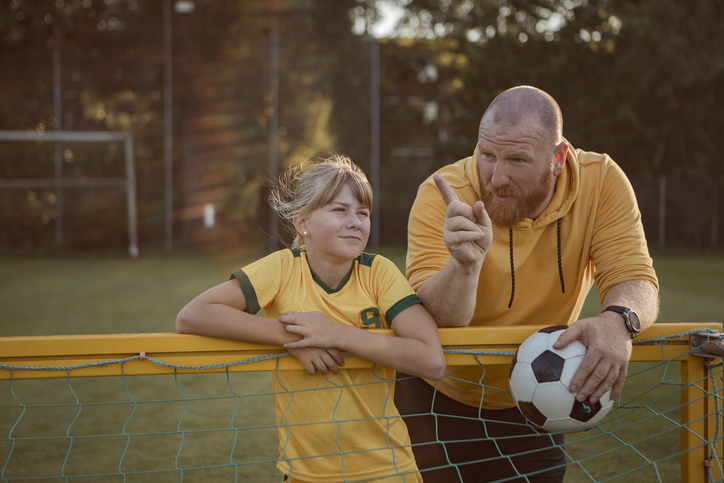Coaching your child's sports team is one of the most rewarding, humbling, and downright chaotic experiences a parent can have. When I first stepped up as “Coach Dad,” I had no idea what I was signing up for. Sure, I loved the idea ofspending more time with my kid and being part of their growth, but I quickly realized it wasn’t just about showing up in a whistle and throwing out a few motivational speeches. It was about learning, adapting, and finding a balance between being a parent, a teacher, and a cheerleader—all while managing a team of kids with wildly different personalities.
The Decision to Coach
I volunteered to coach because I wanted to be more involved in my kids life. Like most dads, I’d spent countless weekends on the sidelines, cheering with a coffee in hand. But then one season, the league was pleading for someone to step up. No coaches meant no team. I figured, how hard could it be? I’d watched enough sports to know the basics, and I thought I could wing the rest. Spoiler alert: I was wrong.
Coaching isn’t just about knowing the rules of the game; it’s about navigating emotions, building confidence, and teaching lessons that go far beyond the field. From the moment I agreed to coach, I knew I’d be learning just as much as the kids—if not more.
Setting the Tone
The first thing I learned as a coach was that kids don’t just need direction; they need an environment where they feel safe and supported. For a lot of kids, sports are about more than just winning. It’s about friendships, growth, and mostimportantly, fun. I made a commitment early on to set a tone that prioritized effort over results. Sure, we all want to win, but the real victories are in the small moments—when a kid who’s been nervous to try finally takes a shot, or when the team starts cheering each other on without being prompted.
One of my biggest challenges was balancing competitiveness with compassion. I wanted to encourage my team to strive for their best, but I also didn’t want anyone to feel like their worth was tied to their performance. It’s a tricky line to walk, but I found that clear communication and leading by example went a long way.
Learning to Be Patient
If there’s one quality every parent-coach needs, it’s patience. Kids are unpredictable, and no matter how well you think you’ve planned your practice, there will always be curveballs. I remember one practice where I had a whole drill sequence mapped out, only to have it derailed by a full-blown debate among the kids about which superhero would win in a fight. I had to laugh and let them have their moment before gently steering the group back to the task at hand.
Patience also comes into play when dealing with skill levels. Not every child on the team will be a natural athlete, and that’s okay. The important thing is to meet each kid where they are and help them build confidence. I learned to celebrate the small wins—like when a shy player started calling for the ball or when a kid who’d been struggling with coordination finally nailed a pass.
Building Relationships
As a coach, you’re not just guiding your own child; you’re building relationships with every player on the team. At first, I was focused on teaching skills and running plays, but I quickly realized that connection was just as important as technique. Kids need to feel seen and valued, and something as simple as remembering their favorite position or asking about their day can make a huge difference.
It’s also important to build trust with the parents. At the end of the day, they’re entrusting you with their kids, and that’s a big deal. I made it a point to keep parents in the loop—whether it was through quick updates after practice or sending outan occasional email to share highlights and reminders. Transparency and open communication go a long way in creating a positive dynamic.
Balancing Dad vs. Coach
One of the toughest parts of coaching your child’s team is finding the balance between being “Dad” and “Coach.” I’lladmit, there were times when I was harder on my own kid than I was on anyone else. It wasn’t intentional, but I think as a parent, you just naturally have higher expectations for your own child. I had to remind myself that when we were on the field, I wasn’t just their dad—I was their coach, and that meant being fair and treating them the same as I treated every other player.
On the flip side, it was also important to leave the game on the field. After practice or a game, I didn’t want to fall into the trap of overanalyzing everything with my kid. I learned to ask open-ended questions like, “What did you enjoy most today?” instead of offering unsolicited advice. It was a way to show support without putting unnecessary pressure on them.
Handling the Challenges
Let’s be real—coaching isn’t always sunshine and high-fives. There are challenging moments, whether it’s dealing with a tough loss, managing a player who’s not listening, or navigating conflicts between teammates. One season, I had two kids who just couldn’t get along. It was impacting the whole team dynamic, and I knew I had to address it. I sat them down separately to hear their perspectives, then brought them together to talk it out. It wasn’t easy, but by the end of the season, they were laughing and working together like a well-oiled machine.
There are also moments when you’ll feel out of your depth. I’ve had to Google more coaching tips than I’d like to admit, and I’ve leaned heavily on advice from other parent-coaches. The key is to stay humble and remember that it’s okay not to have all the answers. What matters is your willingness to learn and adapt.
The Rewards
For all the challenges, coaching has been one of the most rewarding experiences of my life. There’s nothing quite like watching a group of kids grow in skill, confidence, and teamwork over the course of a season. I’ve seen kids go from barely touching the ball to scoring game-winning goals. I’ve watched friendships form and self-esteem blossom. And I’vefelt an immense sense of pride—not just in my own child but in every player on the team.
Coaching has also deepened my bond with my own kid. Sure, there have been moments of frustration, but there’ssomething special about sharing those experiences together. It’s given me a front-row seat to their growth and a chance to be part of their journey in a way that goes beyond the sidelines.
Final Thoughts on Coaching Your Kid’s Sports Team
Coaching your child’s sports team isn’t for the faint of heart, but it’s an experience that’s truly worth it. Along the way, you’ll learn patience, empathy, and the value of focusing on the bigger picture. It’s not just about the wins, the trophies, or the scoreboards—it’s about creating lasting memories, teaching important life lessons, and building strong relationships as a team.
If you’re considering taking on the role of “Coach Dad,” my advice is simple: go for it. Yes, it will challenge you, test your patience, and push you outside your comfort zone. But it will also allow you to make a meaningful impact on the lives of a group of kids, including your own. And you might just discover that you’re learning and growing as much as they are.
Ultimately, coaching is about more than sports—it’s about making a difference. So lace up those sneakers, grab that clipboard, and embrace the journey. The rewards are far greater than you can imagine.


